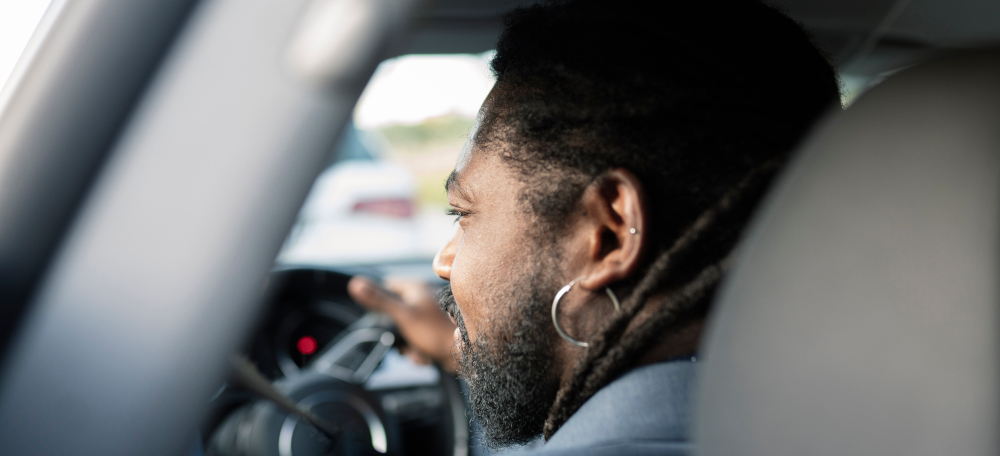
What SA’s Night Taxis Hear But Don’t Repeat
The streets begin to change after ten. It’s not that the city goes quiet, it never does, but something in its voice softens. The clatter of the day falls away. The pace of foot traffic slows. The pavement vendors pack up their stools, and the shopkeepers roll down the shutters that have kept them visible all day. And then, almost silently, the night taxis begin to hum through the streets like veins in a sleeping body. White Quantums. Red stripe. Sliding door. One hand on the wheel, the other resting near the gearstick, waiting to nudge forward into motion. Inside, the lights are dim, sometimes a soft blue, sometimes the flicker of a phone screen bouncing off the window. The engine noise takes over from the day’s voices. But not all voices are gone. Some travel with you.
It’s in these late hours, between one fare and the next, between petrol station stops and backstreet pickups, that a different kind of South African story unfolds. A quieter one. No headlines. No hashtags. Just voices in transit, sentences dropped into the dark, too vulnerable to say in daylight. And the taxis? They keep it all. Not like secrets guarded behind locks, but like water held loosely in cupped hands, present, but never gripped too tightly.
The night taxi driver is more than just a driver. He is witness. To tension. To heartbreak. To grief so quiet it doesn’t even need words. There’s a woman who always catches the 11, 40 from Jabulani. She never looks at her phone. Never says where she’s going. Once, when the taxi took longer than usual to fill, she began to cry. Not loudly. Just softly enough for the tears to roll past her chin and onto her blouse. Nobody said anything. Not the driver. Not the guy next to her. Not even the drunk who usually mumbles things about politics and petrol. Everyone just let it pass. That’s the thing about night taxis, they give you space to fall apart without explanation.
In Mamelodi, a man climbs in with nothing but a crate of empty bottles. His hands smell of yeast and hard work. He tells the driver to take the long route. Says he wants to breathe before he goes home. Doesn’t say why. Doesn’t need to. The window is already cracked open. The night air comes in, washing over his face. He sits back. And breathes.
People talk differently in the dark. Some confess things they’d never say at noon. Affairs. Fears. Prayers that didn’t get answered. There’s a couple who take the late taxi from Bree to Yeoville. They sit in the back, always arguing in whispers. Not about cheating or money, but things like who forgot to buy electricity or who left the tap running. Their arguments sound like routine. Like love dressed in tired clothes. Once, they laughed. That kind of laughter that surprises both people. Like they’d forgotten how to do it. The driver smiled. Quietly. Just kept driving.
Taxis hear everything. The man on speakerphone begging his mother to open the gate. The teenage girl muttering lyrics into her hoodie sleeve like spells. The nurse on her way to a night shift, repeating the Lord’s Prayer under her breath with each bump in the road. The gambler with fresh slips in his back pocket, running numbers over and over in his head. The factory worker texting her child to leave the porch light on.
 And then there are the silences. The deep ones. When everyone’s too tired to talk. Eyes closed. Heads resting against glass. The drone of tyres against tar. The occasional cough. In those moments, the taxi becomes something sacred. A capsule of weariness. A brief reprieve. No one asks where you’re going emotionally. Just whether you’ve got change for the fare.
And then there are the silences. The deep ones. When everyone’s too tired to talk. Eyes closed. Heads resting against glass. The drone of tyres against tar. The occasional cough. In those moments, the taxi becomes something sacred. A capsule of weariness. A brief reprieve. No one asks where you’re going emotionally. Just whether you’ve got change for the fare.
The drivers, they carry it all. Some have heard stories that could break you. Others have seen things that they’ll take to the grave. But they don’t speak. Not to journalists. Not even to their own families. Because the rule is unspoken but firm, what happens in the backseat stays there. They are the last guardians of unfiltered South African truth. Unpaid therapists. Silent scribes. Guardians of the version of this country you can’t livestream.
Sometimes the radio is on, turned low. Maskandi or gospel. Sometimes it’s just the engine. The sound of motion. The sound of getting away from something, or heading into it. And always, the cracked window. Just wide enough for the smoke to leave, or for the voices to feel less boxed in. That window does more than let in air. It gives people room to speak, to whisper, to hum. To be heard without being remembered.
There’s a superstition among some drivers. They say never ignore a person who wants to talk after midnight. That when someone speaks at that hour, they’re not just talking to you, they’re talking to their past, to their future, to their ghosts. So you listen. Not because you’re nosy, but because sometimes, being listened to is the only medicine they have.
And at the end of it all, they get off. One by one. Leaving behind their scent, their warmth, their unfinished sentences. The driver nods. The door slides closed. The road keeps pulling. Another stop. Another story. Another secret that won’t be repeated.
Because that’s the contract of South Africa’s night taxis. You may come in carrying too much. But when you leave, you’ve left something behind. Not forgotten. Just absorbed. Carried onward in the hum of an engine and the crackle of tyres on asphalt. Hidden in a vehicle that asks nothing except, “Where to?” and listens harder than anyone you know.




